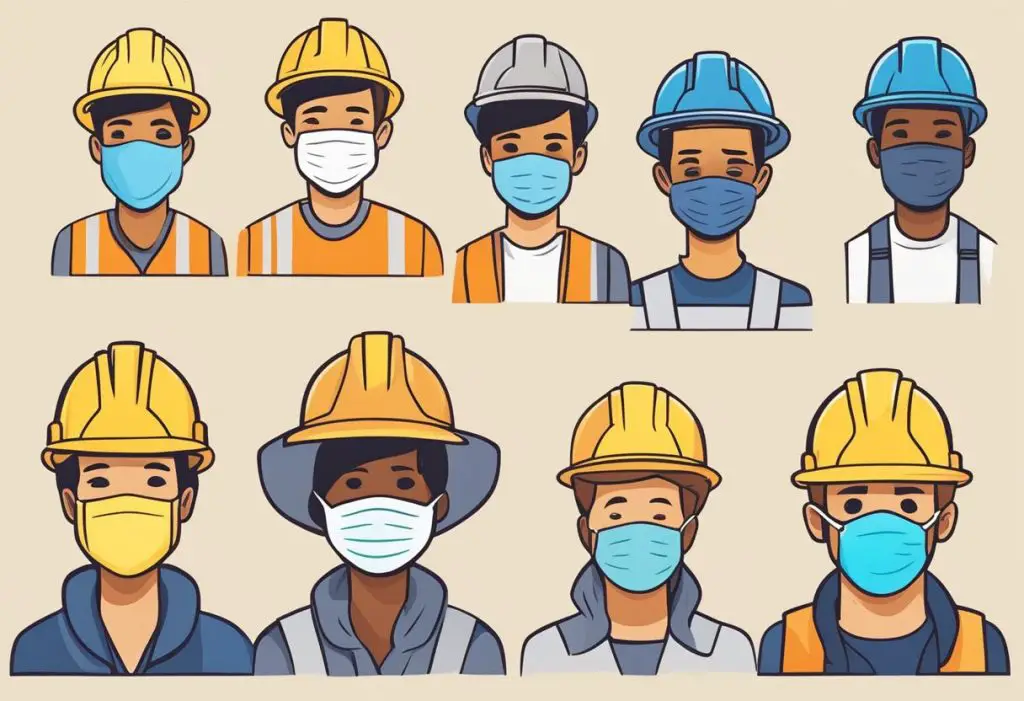Construction workers face many occupational hazards daily, including exposure to harmful chemicals, dust, and other irritants that can take a toll on their skin. As a result, workers in the construction industry need to take extra precautions to protect their skin from damage.
Understanding Skin’s Role in Construction Work

Your skin is the largest organ in your body and is critical in protecting you from the environment. For construction workers, their skin is the first line of defense against harmful chemicals, UV rays, and other irritants that can cause damage. As part of a daily routine, it’s essential to take care of your skin to ensure that it remains healthy and functioning correctly.
Common Skin Problems for Construction Workers Despite the importance of skin health, many construction workers suffer from various skin conditions due to their work. These can include dryness, itching, redness, and even more serious diseases like skin cancer. Fortunately, there are steps that workers can take to prevent these problems and protect their skin from damage.
Skin Health Key Takeaways
Skin is critical in protecting construction workers from harmful chemicals and irritants.
Common skin problems for construction workers include dryness, itching, and redness.
Taking steps to prevent skin damage, such as using protective clothing and moisturizing regularly, can help workers maintain healthy skin.
Understanding Skin Issues in Construction Work

As a construction worker, you know that your job can be harsh on your skin. Your skin is the largest organ in your body, and it plays a vital role in protecting you from the environment. However, when you work in construction, your skin is exposed to various risks that can cause damage. Working hands require protection.
If you don’t look after your skin, your hands might become dry and cracked and need time to heal. Construction work often involves exposure to harsh weather conditions, such as extreme heat or cold, wind, and rain. These conditions can lead to dry hands, itchy and irritated. Additionally, working with tools and machinery can cause cuts, scrapes, and other injuries that can damage your skin.
Anyone working in the construction industry or anyone who spends the majority of their day outside should care for their skin to lessen these risks. Proper skincare includes wearing protective clothing, such as long-sleeved shirts, pants, and gloves, to protect your skin from the elements, cuts, and scrapes. Using sunscreen to protect your skin from the sun’s harmful UV rays would be a best practice.
It’s also essential to keep your skin clean and moisturized. This can help prevent dryness and irritation and can also help prevent infections from cuts and scrapes. Use gentle cleansers and moisturizers that are designed for your skin type.
As a construction worker, your skin protects you from the environment. However, your skin is also at risk from the hazards of construction work. Caring for and protecting your skin from the elements and injuries can help prevent damage and keep it healthy. Prevention is key!
Common Skin Care Problems for Construction Workers

As a construction worker, you are exposed to various skin problems due to the nature of your job. The most common skin problems you may encounter include dermatitis, eczema, and contact dermatitis.
Dermatitis is a general term that refers to skin inflammation. Numerous factors, including exposure to harsh materials, irritants, and allergens, can cause it. Symptoms of dermatitis may include redness, itching, and blistering.
Eczema is a chronic skin condition characterized by dry, itchy, and inflamed skin. Various factors, including genetics, environmental factors, and stress can cause it. Symptoms of eczema may include redness, itching, and scaling.
Contact dermatitis is a type of dermatitis that is caused by exposure to a specific substance. There are two types of contact dermatitis: irritant contact dermatitis and allergic contact dermatitis. Irritant contact dermatitis is caused by exposure to irritants, such as chemicals or detergents. Allergic contact dermatitis is caused by exposure to an allergen, such as latex or nickel.
Occupational contact dermatitis is a type of contact dermatitis that is caused by exposure to substances in the workplace. It is a common occupational skin disease among construction workers. Symptoms of occupational contact dermatitis may include redness, itching, and blistering.
In addition to these skin problems, construction workers are at an increased risk for skin damage and skin cancer. Prolonged exposure to the sun’s UV rays can lead to skin damage and increase the risk of skin cancer, including melanoma. We cannot stress this enough: please take sun protection seriously.
To prevent these skin problems, taking steps to protect your skin from harsh elements on the job is mandatory. This may include wearing protective clothing, such as long-sleeved shirts and hats, sunscreen with an SPF of 30 or higher, and avoiding exposure to chemicals and other irritants. If you develop a skin problem, seeking medical attention to prevent further complications is essential.
Causes of Skin Problems in Construction Industry

As a construction worker, you will likely be exposed to various substances and environmental factors that can cause skin problems. Some of the most common causes of skin problems in the construction industry include:
Exposure to chemicals: Many construction materials contain chemicals that can irritate or sensitize your skin. Chemicals commonly found in construction materials include tar, cement, resins, epoxy resins, and chromate.
Sweat and humidity: Working in hot and humid conditions can cause your skin to become moist and irritated, leading to skin problems such as heat rash and fungal infections.
Sun exposure: Construction workers often work outdoors, which means they are exposed to the sun’s harmful UV rays. Overexposure to the sun can cause skin damage, including sunburn, premature aging, and an increased risk of skin cancer.
Irritants: Construction workers may come into contact with various irritants, such as dust, dirt, and metal shavings, which can cause skin irritation and inflammation.
Friction: Wearing tight or ill-fitting clothing or using tools that cause friction against your skin can lead to skin problems such as chafing and blisters.
Temperature changes: Moving between hot and cold environments can cause your skin to become dry and irritated.
To protect your skin from these and other hazards, it is crucial to take appropriate precautions, such as wearing protective clothing, using sunscreen, and washing your skin thoroughly after exposure to chemicals or irritants.
Prevention of Skin Problems

As a construction worker, your skin can be exposed to various hazards, such as dirt, dust, chemicals, and UV radiation. These hazards can cause skin problems, including dryness, irritation, rashes, and skin cancer. However, you can prevent these problems by taking some preventive measures.
One of the most important preventive measures is washing your skin regularly. You should wash your skin with mild soap and warm water, especially after working with chemicals or other hazardous materials. However, avoid using hot water, which can dry your skin. Also, avoid using harsh soaps that can strip your skin of its natural oils.
Hand washing is also crucial for preventing skin problems. It would help to wash your hands frequently, especially before eating, drinking, or smoking. Use warm water and soap, and dry your hands thoroughly. If you can’t wash your hands, use hand sanitizer that contains at least 60% alcohol.
A barrier cream or lotion can also protect your skin from hazardous materials. These products create a protective layer on your skin, preventing chemicals and other hazards from penetrating your skin. You should apply the cream or lotion before starting work and reapply it every few hours.
Moisturizing your skin is essential for preventing dryness and irritation. You should use a moisturizer suitable for your skin type and apply it after washing or taking a shower. Moisturizing your skin can also help prevent wrinkles and other signs of aging.
Protecting your skin from the sun is also crucial. Wear protective clothing, such as long-sleeved shirts, pants, and hats, and sunscreen with at least SPF 30. Remember to reapply sunscreen every two hours or after sweating or swimming.
Personal protective equipment (PPE), such as gloves, can protect your skin from hazards. You should wear gloves appropriate for the task, such as waterproof gloves for working with water or disposable gloves for handling chemicals.
In summary, preventing skin problems as a construction worker involves washing your skin regularly, using barrier creams and lotions, moisturizing your skin, protecting your skin from the sun, and using appropriate PPE. By taking these preventive measures, you can keep your skin healthy and avoid skin problems.
Treatment and Care for Damaged Skin

As a construction worker, your skin is constantly exposed to harsh environmental factors like dust, dirt, and UV radiation. This can lead to dry, damaged, and cracked skin. Caring for your skin is essential to prevent further damage and promote healing.
If you have dry skin, it’s important to moisturize regularly. Look for fragrance-free and non-comedogenic moisturizers that won’t clog your pores. Apply moisturizer to your skin immediately after showering or washing your hands to lock in moisture.
Consider using a healing ointment or cream if your skin is damaged or irritated. These products can help soften and smooth your skin while promoting healing. Look for products that contain ingredients like petrolatum, lanolin, or dimethicone.
If you have sensitive skin or allergies, read the labels of any skincare products you use. Avoid products that contain fragrances, dyes, or other potential irritants. If you experience any irritation or allergic reactions, stop using the product immediately and consult a dermatologist.
In addition to using skincare products, there are other steps you can take to care for your skin. Wear protective clothing, such as long sleeves and hats, to shield your skin from the sun and other environmental factors. Avoid using hot water when washing your hands or showering, as this can further dry your skin.
By taking these steps as part of your daily routine, you can help prevent further damage to your skin and promote healing. If you have any concerns about your skin, consult a dermatologist for personalized recommendations.
Employer’s Role in Skincare Safety

As an employer, it is your responsibility to ensure the safety and health of your employees. This includes protecting them from occupational injuries, such as skin damage caused by exposure to hazardous substances.
To promote skin safety on the construction site, you should implement processes that protect your employees from harmful substances. This can include providing appropriate personal protective equipment (PPE), such as gloves and protective clothing, and ensuring employees are trained to use them correctly.
It is also essential to regularly assess the workplace for potential hazards and take steps to eliminate or reduce them. This can include using less harmful substances or implementing engineering controls, such as ventilation systems.
The Centers for Disease Control and Prevention (CDC) recommends that employers implement a comprehensive skin protection program that includes the following elements:
- Hazard identification and assessment
- Skin protection measures, including PPE
- Employee training and education
- Medical surveillance and evaluation
- Program evaluation and improvement
By taking these steps, you can help prevent occupational skin injuries and promote a safe and healthy workplace for your employees.
Understanding and Managing Skin Conditions

As a construction worker, your skin is constantly exposed to various environmental factors that can be harmful to your skin. It is important to understand and manage these conditions to maintain healthy skin.
Skincare: Proper skin care is crucial in preventing skin problems. Make sure to wash your hands and exposed skin regularly with mild soap and water. Use a moisturizer to keep your skin hydrated and protect it from drying out.
Hands: Your hands are the most exposed part of your body and are susceptible to calluses, cuts, and injuries. Wear gloves to protect your hands from cuts and bruises. Use a hand cream or lotion to keep your hands moisturized.
Tan: Working outdoors can lead to a tan, but excessive sun exposure can cause skin damage. Apply sunscreen with at least SPF 30 to exposed skin to protect it from harmful UV rays.
Absorption: Chemicals and other substances that come into contact with your skin can be absorbed into your body. Be aware of the substances you are working with and use protective clothing when necessary.
Bacterial: Bacteria can cause skin infections. Keep your skin clean and dry to prevent bacterial growth. If you notice any symptoms of a skin infection, seek medical attention.
Link to Injuries: Skin injuries such as cuts and wounds can increase the risk of developing skin infections. Proper wound care is essential in preventing infections.
Occupational Skin Problems: According to the United States Department of Labor, skin problems affect up to 50% of all workers. Construction workers and truck drivers are at a higher risk of skin problems due to their exposure to various environmental factors.
Skin Diseases: Exposure to certain substances can cause skin diseases such as dermatitis. Be aware of the products you work with and take necessary precautions to prevent skin diseases.
Skin Safety: Proper skin care and protection is essential in preventing occupational skin problems. Follow the above tips to maintain healthy skin and to avoid skin problems.
Frequently Asked Questions

How can construction workers protect their skin from harmful UV rays?
Construction workers are at a higher risk of developing skin cancer due to prolonged exposure to the sun’s harmful UV rays. You should wear protective clothing such as long-sleeved shirts, pants, and wide-brimmed hats to protect your skin. You should also apply a broad-spectrum sunscreen with an SPF of at least 30 to all exposed skin, including your face, neck, and ears. Seek shade and reapply sunscreen frequently every two hours or more if you are sweating for continued protection from the sun’s rays.
What are the most effective ways to prevent skin irritation from construction dust?
Construction dust can cause skin irritation, especially if exposed for prolonged periods. Wear protective clothing, including long-sleeved shirts and pants, to prevent skin irritation. You should also wear gloves and a mask to prevent dust from coming into contact with your skin. If you get dust on your skin, scrub it off immediately with soap and water.
What are the best skincare products for construction workers with sensitive skin?
If you have sensitive skin, you should avoid skincare products that contain harsh chemicals or fragrances. Look for products that are fragrance-free and hypoallergenic. You should also choose products that contain natural ingredients, such as aloe vera, chamomile, and oatmeal, which can help soothe and protect your skin.
What are the most common skin diseases that affect construction workers?
Construction workers are at a higher risk of developing skin diseases like contact dermatitis, skin cancer, and fungal infections. Exposure to chemicals, UV radiation, and other environmental factors can cause these diseases. To prevent these diseases, you should protect your skin, including wearing protective clothing and sunscreen.
What are the best practices for maintaining healthy skin as a construction worker?
To maintain healthy skin, you should follow a daily skincare routine that includes cleansing, moisturizing, and protecting your skin from the sun’s harmful UV rays. It would be best to avoid smoking and excessive alcohol consumption, which can damage your skin. Additionally, you should eat a healthy diet rich in fruits and vegetables, which can help improve your skin’s overall health.
How can construction workers prevent dermatitis caused by exposure to chemicals?
To prevent dermatitis caused by exposure to chemicals, you should wear protective clothing such as gloves, long-sleeved shirts, and pants. You should also avoid contact with chemicals whenever possible and wash your skin immediately if you do come into contact with them. If you develop dermatitis, you should seek medical attention and avoid further exposure to the chemical that caused the reaction.

